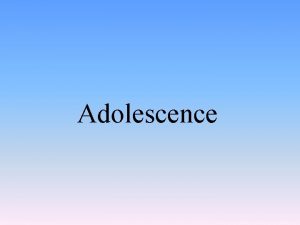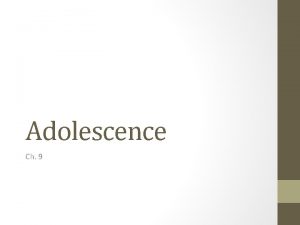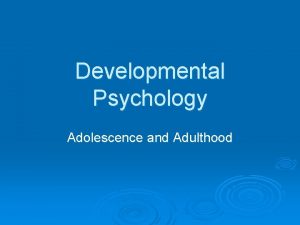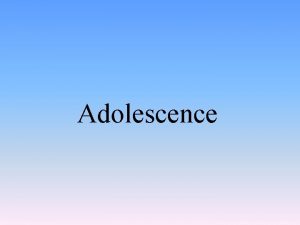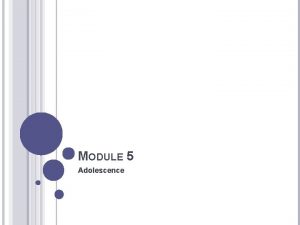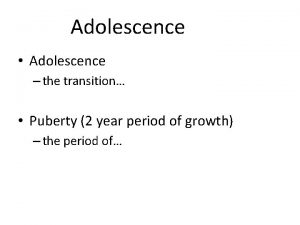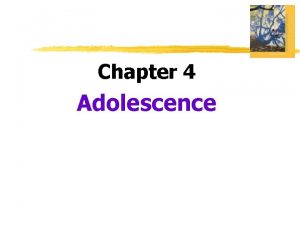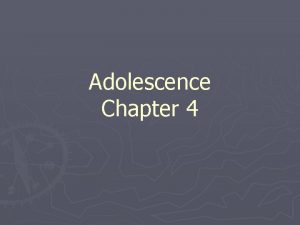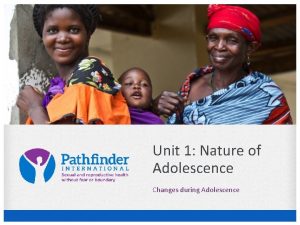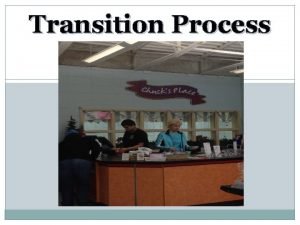ADOLESCENCE Unit 2 THE CONCEPT OF ADOLESCENCE Transition















- Slides: 15

ADOLESCENCE Unit 2


THE CONCEPT OF ADOLESCENCE Transition between childhood and adulthood Not a universal happening Not a part of man’s history Concept has developed over the past 40 -50 years


PHYSICAL SENSE Puberty and growth spurts Ends with full physical maturity

PSYCHOLOGICAL SENSE Refers to state of mind, an attitude, a style of existence that begins with puberty and ends when independent from parents Individual shifts one’s needs for approval, recognition and guidance from parents to peer group

PSYCHOLOGICAL SENSE Frustration between parents and child: independence vs. protection Increased interest in opposite sex § Hero worship: great admiration § Puppy love (junior high, frosh, soph, junior, senior) § Romantic love- intense, mature affection

PSYCHOLOGICAL SENSE Mature enough to think about what they want out of life § Anticipatory socialization: learning the rights, obligations and expectations of a role in preparation for assuming role in later date

ADOLESCENCE AND PEER GROUPS 1. Strive not to be like parents, become more like peers 2. Peer group provides steps towards independence that parents can’t offer 3. Need to be accepted by peers so intense in adolescence it is almost neurotic a. Those who get along with peers accept themselves, have more favorable view

PEER GROUPS 5. Some major functions of peer group a. Takes place of family, have status or lack, get objective feedback b. Stabilizer: adolescence is period of rapid transition, comforting to know others go through same thing c. Source of self-esteem: important to cement outside family, can work in reverse for one who is isolated

DEVELOPMENTAL TASKS OF ADOLESCENCE 1. Achieving new and more mature relations with age mates of both sexes 2. Achieving a masculine or feminine social role 3. Accepting one’s physique and maturation of the body effectively

DEVELOPMENTAL TASKS 4. Achieving emotional independence of parents and other adults 5. Achieving assurance of economic independence 6. Selecting and preparing for an occupation

DEVELOPMENTAL TASKS 7. Preparing for marriage and family life 8. Developing intellectual skills and concepts necessary for civic competence 9. Desiring and achieving socially responsible behavior 10. Acquiring a set of values and an ethic system as a guide to

DEVELOPMENTAL TASKS There are individuals who remain adolescents psychologically all their lives Others rush into adulthood without competing tasks § Drop out before economically able § Marry before they really know self

TABLE TALK Reviewing the developmental tasks of adolescence. . Discuss the importance of socialization during the adolescent years. What are the main agents of socialization? How do these agents/influences change from children?
 Unit 6 review questions
Unit 6 review questions Hát kết hợp bộ gõ cơ thể
Hát kết hợp bộ gõ cơ thể Frameset trong html5
Frameset trong html5 Bổ thể
Bổ thể Tỉ lệ cơ thể trẻ em
Tỉ lệ cơ thể trẻ em Voi kéo gỗ như thế nào
Voi kéo gỗ như thế nào Thang điểm glasgow
Thang điểm glasgow Chúa yêu trần thế alleluia
Chúa yêu trần thế alleluia Các môn thể thao bắt đầu bằng tiếng nhảy
Các môn thể thao bắt đầu bằng tiếng nhảy Thế nào là hệ số cao nhất
Thế nào là hệ số cao nhất Các châu lục và đại dương trên thế giới
Các châu lục và đại dương trên thế giới Công thức tính thế năng
Công thức tính thế năng Trời xanh đây là của chúng ta thể thơ
Trời xanh đây là của chúng ta thể thơ Mật thư anh em như thể tay chân
Mật thư anh em như thể tay chân 101012 bằng
101012 bằng độ dài liên kết
độ dài liên kết
















